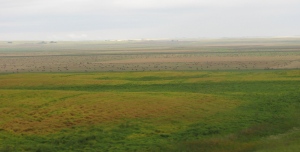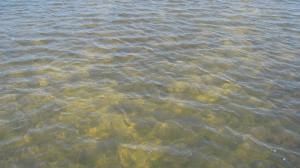On the Trans Canadian Highway we do not travel the same way that we do when we travel in the U.S. Actually, the traveling is different almost everywhere we have gone on Canadian highways outside of the greater Toronto area. In short, this is not your typical interstate highway system at all, despite the fact that we are almost always within 100 miles of the U.S. border and traveling on the major highway that runs east to west across more than 7,500 km of the second largest country in the world.
We drive beyond the truck stop chains and the creature comforts they offer with fill-up deals of free coffee and clean updated showers, 24hr services and (usually) large parking lots. We drive beyond the cottages and beyond the places where even the bathroom may no longer be free or working, onto the road where there may be nothing at all, not even a gravel spot to pull-over, where NIGHT DANGER MOOSE signs or images of prancing deer and dashing elk prevail. The passing lanes dwindle to rarer sightings but luckily our fellow travelers, even trucks, dramatically decrease at a similar rate. Rather than Hail Hail to Tim Horton’s individual washrooms, I say Hail Hail to the man who pumped out and hosed down the outhouse on the Coquihalla highway at a brake check area just as we were pulling into it. As we drive further and further out I begin to think that many of the billboards for hotels with free internet and free breakfast are like sirens song. I then realized even the mile markers (km in Canada of course) and exit numbers in the U.S. are a statement about population density and luxury akin to remote control devices or rose garden sightings.
The TCH is not the Yukon or as far out as Yellow Knife nor lawless nor unpaved. However, we do travel through small towns that pass as quickly as we can pronounce their names; Vermillion Bay, Moosomin, and the more challenging names like Assiniboine and Ochiichagwebabigoining (ok, we didn’t pass that last town, but very near to it). There are countless villages with a single trading post/gas station/convenience/gift store with populations that statistically hover around 1000 but appear more like 10 to a few hundred at most. We don’t see the best of these towns. We don’t buy live bait or leaches that are so prolifically for sale, or get out on the lake and trawl along the grassy edges of lake Superior or the hundreds of other pristine lakes I wish I could just dive into straight from the truck window. We can’t take the time to climb the mountains to their foggy and stony peaks. We don’t see the rodeo or the local artists. We don’t learn anything more about First Nations people except that they seem to hug the wilderness to them and with that the beauty of Canada. We just barely enjoy the fresh smell of black spruce forests and spot hawks holding court on the tops of hay bails and we occasionally squint at the tiny ducks swimming with even tinnier baby ducks in salt marshes.
The highlight of the trip, much as it was in crossing the U.S. was the expanse of protected and undeveloped land that even southern Canada can boast about. Although I advocate for the conservation of open space and often long for silence from other human beings, what strikes me as we drive along these struggling small towns is that the shame is on the same principle. I look out across the thousands of kilometers of mostly hay fields and I have to believe that the world can do better, and by better I mean, can’t we share more of this.
Why are we planting acres and acres of hay for cows we don’t need to feed the wealthy of the world, while hundreds of millions of people die for lack of some potatoes, green vegetables, and a few humble carrots? Why are people so crowded up the hills of human waste in mega cities, sprawling along coveted ocean sides for water views in million dollar bungalows, and elbowing each other off of trains and buses from Boston to Mumbai? Now dear reader I understand that city does not have to equal misery and that the efficiency and lower ecological footprint of multi-story housing are strikes against my ideas of rural transplantation, but I want to suggest here a radically naïve and idealistic notion to voluntarily transplant people from urban congestion and suburban super-sprawl to rural towns; not as laborers or based upon some kind of imperialist or racist scheme, but to develop self-sufficient rural living. I will further admit my bias is that I am more entertained by the “Moose on the Loose” signs than by any Tony award winning theater and that my desire to plant a large vegetable garden borders on obsession.
Still, as the hours go by and by and by, and my one arm hides from the burning sun and my husband’s other arm turns as brown as the waters of an Ontario creek all I see is a sprinkling of mobile homes and a remarkably small number of ranch houses and even fewer farm houses. I can’t help but imagine that there are a lot of people in the world that would cry for the injustice of a land so poorly used. I can’t help but imagine that there are hundreds of thousands who could benefit from a combination of entrepreneurial creativity, the values of self-sufficiency, and green living ecology. Skilled people, doctors and engineers, ecological scientists, vegetable farmers, and artists from all over the world could create and build on a more subsistence, self-sustaining way of life in rural Canada and the U.S. What more do we need than local food, a small health center, school, hardware store, library and a mechanic, and some solar and wind power? The number of settlements that lacked these basics were too numerous to count. The exceptions in towns like Opasitika remain quaint and precious.
Maybe it has something to do with the nature of politics, the corruption that causes mayors and many others to resign in shame, or maybe it has something to do with the 17 or more bridges that I counted (sleep periods excepted) that were under construction just between Kenora and North Bay. Or maybe it is related to the disintegration of the Canadian multicultural charter, or fanatic post 9/11 fear easing its way into deeper xenophobia and cultural protectionism. Or maybe it’s the simple lack of a critical mass of people willing to take the risk in the great white north, but I don’t think so. I think it is a greater lack of willingness to stop competing with the Jones’ or the Sohdi’s for that matter, and to more honestly recruit and provide institutional support for a true immigrant dream of a farm, a home, a way of life under a democracy and in the pursuit of happiness through a more balanced relationship with our environment and with our community.
Yes, strengthening and populating rural communities would mean living in a place where you can’t find a store to buy the newest biggest TV, or fashionable clothes and it would be colder and snowier, but compared to the compaction and stress of urban life, the poverty and the hunger of life within many North American and international communities, wouldn’t it be better. And how can we compare the shiny (and I would say useless) wealth of city buildings and perfectly landscaped yards to the priceless resources of the land, clean water and abundant fresh air and a neighbor who knows your name in a rural town.
I think it is unreasonable to remain unquestioning while working 50 or more hours a week, commuting 2 hours a day and working until we are 70 years old just to get the house, the car and the pool and put the kids through college. Furthermore, who dreams of coming to Canada to be a truck driver or a Tim Horton’s barista? Who dreams of being a farm laborer for so many years that it is only the next generation that can dream of running a farm? I don’t mean to discount the fact that any job, though commonly exploited and dangerous is better than no job. However, I think that we settle for truck driving and similar jobs because it is possible and easily reached while we hold our greater callings and dreams at bay, keeping them close like memory stones in our pockets. I would not like to wait until we are 70, or even 50 to live that more integrated life. But for now we practice our patience, we labor, we look out the window. We are stuck in the system that drives us and keeps us in the cities. We hang on and we hope to slowly negotiate our way out of debt and out of the suburbs until we can safely launch ourselves into the great white north, someday, somewhere along the Trans Canadian Highway when we won’t have to look back anymore.


